Details

A Theory of Forced Labour Migration
The Proletarianisation of the West Bank Under Occupation (1967-1992)|
CHF 118.00 |
|
| Verlag: | Springer |
| Format: | |
| Veröffentl.: | 02.06.2020 |
| ISBN/EAN: | 9789811532009 |
| Sprache: | englisch |
Dieses eBook enthält ein Wasserzeichen.
Beschreibungen
This book focuses on labour dislocation and migration of Palestinians between 1967 and 1992. In particular, it highlights the social transformations in the occupied Palestinian territory where Palestinian labour was permitted to work in Israel from 1968 onwards. Elaborating on the results of the policy which saw a gradual increase in the number of Palestinian workers commuting daily from a negligible proportion of the actively participating labour force, to 35 percent of all employed persons, and 60 percent of all wage paid workers, the book studies this unique case which embodies characteristics from permanent migration situations not only in the de-jure, but also the de-facto sense; insofar as it embeds higher risks and reallocates resources as if it was a permanent relocation scenario. Illustrated with tables and econometric results, the book identifies the determinants and implications of migrant labour from the West Bank using two broad methodologies: the neoclassical and the historical-structural method. Each of these methods is divided into two branches: the classical divided into price determined and a choice-theoretic framework,and the historical-structural divided into dependency and Marxist theory. In order to gain a comprehensive understanding of the situation, all four perspectives are employed in the investigation. In doing so, what emerges is a structure for the book which takes shape along the different lines of migration literature. The book provides new insights into the making of wage labour and labour migration theory.<div></div>
<div><p>Ch1. An historical introduction to the subject.- Ch2. Dual Economy Models and their Relevance to Conditions in the West Bank.- Ch3. Modelling and testing empirically the case of oscillating labour in the West Bank.- Ch4. The structural approach and its relevance: the dependency case.- Ch5. The Structural Approach: The Radical dependency case.- Ch6. The choice theoretic framework.</p></div>
This book focuses on labour dislocation and migration of Palestinians between 1967 and 1992. In particular, it highlights the social transformations in the occupied Palestinian territory where Palestinian labour was permitted to work in Israel from 1968 onwards. Elaborating on the results of the policy which saw a gradual increase in the number of Palestinian workers commuting daily from a negligible proportion of the actively participating labour force, to 35 percent of all employed persons, and 60 percent of all wage paid workers, the book studies this unique case which embodies characteristics from permanent migration situations not only in the de-jure, but also the de-facto sense; insofar as it embeds higher risks and reallocates resources as if it was a permanent relocation scenario. Illustrated with tables and econometric results, the book identifies the determinants and implications of migrant labour from the West Bank using two broad methodologies: the neoclassical and the historical-structural method. Each of these methods is divided into two branches: the classical divided into price determined and a choice-theoretic framework,and the historical-structural divided into dependency and Marxist theory. In order to gain a comprehensive understanding of the situation, all four perspectives are employed in the investigation. In doing so, what emerges is a structure for the book which takes shape along the different lines of migration literature. The book will provide new insights into the making of wage labour and labour migration theory.
<p>Comprehensive study of the process of indigenous labour extirpation in the West Bank</p><p>Gauges the impact of colonial settler occupation and practice on traditional ways of life</p><p>Addresses the subject from various theoretical angles and highlights how this experience contributes to theory</p>
This book focuses on labour dislocation and migration of Palestinians between 1967 and 1992. In particular, it highlights the social transformations in the occupied Palestinian territory where Palestinian labour was permitted to work in Israel from 1968 onwards. Elaborating on the results of the policy which saw a gradual increase in the number of Palestinian workers commuting daily from a negligible proportion of the actively participating labour force, to 35 percent of all employed persons, and 60 percent of all wage paid workers, the book studies this unique case which embodies characteristics from permanent migration situations not only in the de-jure, but also the de-facto sense; insofar as it embeds higher risks and reallocates resources as if it was a permanent relocation scenario. Illustrated with tables and econometric results, the book identifies the determinants and implications of migrant labour from the West Bank using two broad methodologies: the neoclassical and the historical-structural method. Each of these methods is divided into two branches: the classical divided into price determined and a choice-theoretic framework,and the historical-structural divided into dependency and Marxist theory. In order to gain a comprehensive understanding of the situation, all four perspectives are employed in the investigation. In doing so, what emerges is a structure for the book which takes shape along the different lines of migration literature. The book will provide new insights into the making of wage labour and labour migration theory.

















